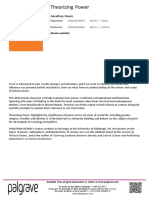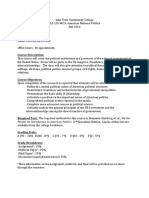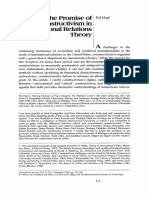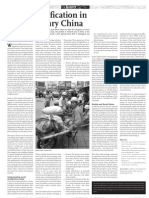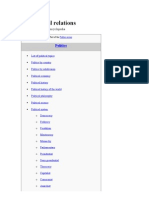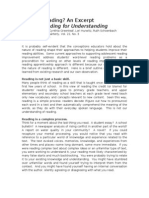Walzer's Theory of Morality in International Relations
Walzer's Theory of Morality in International Relations
Uploaded by
NikeBCopyright:
Available Formats
Walzer's Theory of Morality in International Relations
Walzer's Theory of Morality in International Relations
Uploaded by
NikeBOriginal Description:
Copyright
Available Formats
Share this document
Did you find this document useful?
Is this content inappropriate?
Copyright:
Available Formats
Walzer's Theory of Morality in International Relations
Walzer's Theory of Morality in International Relations
Uploaded by
NikeBCopyright:
Available Formats
Walzer's Theory of Morality in International Relations
Gerald Doppelt
Philosophy and Public Affairs, Vol. 8, No. 1. (Autumn, 1978), pp. 3-26.
Stable URL:
http://links.jstor.org/sici?sici=0048-3915%28197823%298%3A1%3C3%3AWTOMII%3E2.0.CO%3B2-T
Philosophy and Public Affairs is currently published by Princeton University Press.
Your use of the JSTOR archive indicates your acceptance of JSTOR's Terms and Conditions of Use, available at
http://www.jstor.org/about/terms.html. JSTOR's Terms and Conditions of Use provides, in part, that unless you have obtained
prior permission, you may not download an entire issue of a journal or multiple copies of articles, and you may use content in
the JSTOR archive only for your personal, non-commercial use.
Please contact the publisher regarding any further use of this work. Publisher contact information may be obtained at
http://www.jstor.org/journals/pup.html.
Each copy of any part of a JSTOR transmission must contain the same copyright notice that appears on the screen or printed
page of such transmission.
The JSTOR Archive is a trusted digital repository providing for long-term preservation and access to leading academic
journals and scholarly literature from around the world. The Archive is supported by libraries, scholarly societies, publishers,
and foundations. It is an initiative of JSTOR, a not-for-profit organization with a mission to help the scholarly community take
advantage of advances in technology. For more information regarding JSTOR, please contact support@jstor.org.
http://www.jstor.org
Mon Jan 7 16:57:38 2008
GERALD DOPPELT
Walzer's Theory of Morality
in International Relations
In his new book Just and Unjust Wars, one of Michael Walzer's central concerns is to advance a theory of international aggressi0n.l His
theory would guide us in determining precisely when one state practices aggression against another and on what grounds aggression is immoral. It would also help to define the nature of the right possessed by
the victims or observers of aggression to resist militarily and punish
the aggressors. For Walzer, aggression involves the forceful violation
by one state of the territorial integrity or political sovereignty of an
independent state. As such, it defines the most serious moral problem
which arises in international relations; it is "the only crime that states
can commit against other states: everything else is, as it were, a misdemeanor" (JUW, p, 51).
Walzer's theory of aggression is articulated by means of what he
calls the "legalist paradigm" which postulates a moral order among
independent states on an analogy with the more familiar case of the
civil order among independent citizens within any one state. From
the standpoint of this paradigm, states have rights and duties; they
can suffer or commit crimes such as murder or armed robbery in
their relations to one another in much the same way as do persons
(or citizens) within a particular society. Indeed, on Walzer's "domesI. Michael Walzer, Just and Unjust Wars (New York: Basic Books, 1977).
Hereafter referred to as JUW.
O 1978by Princeton University Press
Philosophy G Public Affairs 8,no. I.
0048-3915/78/030003-23$01.15/
I
Philosophy G Public Affairs
tic analogy," states are like persons in that the proper moral order between both sorts of "individuals" derives from their deepest underlying claims to independence and autonomy. Just as every state in principle regulates the relations among its citizens to secure each some
privileged sphere of autonomy (for example, Lockean rights), states
ought to regulate their relations in order to secure for each state a
similar freedom from external force or intervention. Such autonomy
is conventionally signified in terms of a nation's right to political sovereignty, territorial integrity, and self-determination. Drawing on this
paradigm, Walzer elaborates his theory of aggression as a system of
axioms, which can be paraphrased as follows. There exists an international society of independent states, each of which has rights of
territorial integrity and political sovereignty. Any use or imminent
threat of military force by one state against the rights of another constitutes criminal aggression and justifies forceful resistance and eventual punishment meted out either by the victim or by other states
within international society or both. Finally, the use of military force
by one state in relation to another can be justified only as a response
to aggression, and not for any other end (with a few exceptions to
be noted later), JUW,pp. 61-62.
The initial power of Walzer's legalist paradigm is the great simplicity and elegance of the absolute moral prohibitions it justifies to
starkly limit the occasions for the legitimate use of military force in
international relations. But this paradigm generates a series of problems which, as Walzer himself realizes, must be solved if it is to work.
The problems grow out of the paradigm's basic analogy between persons and states. When the classical liberal theorists (for example,
Locke) argued that all human beings have certain rights of life and
liberty, it is fairly clear who has these rights, what entitles them to
these rights, and the conditions under which they might be legitimately denied. But rights of states to territorial integrity and political
sovereignty are much more difficult and controversial to determine.
First, who is correctly viewed as the bearer of the rights of political
sovereignty? Is it the people of the nation-state as a whole? Or is it
the particular government which claims to rule them with legitimacy?
Obviously, aggression directed at a tyrannical government, and at
Walzer's Theory o f Morality
those few who may upon some occasion be paid or intimidated to look
after its defense, need not necessarily amount to aggression against
the people or nation itself. Second, if a state does have the right of
political sovereignty, in virtue of what features does it have this right?
For example, as Locke would have it, only a government which protects
the natural rights of its citizens and enjoys their consent gains the
rights of political sovereignty. Third, when does a state or government
which has this right forfeit it? Following Walzer's legalist paradigm,
just as an individual within a society forfeits his rights (or at least
some of them) when he violates the rights of another, a state which
commits aggression against the rights of another state loses its political sovereignty, at least in some degree; it can be punished against its
will. So far so good. But let us carry the analogy one step further. An
individual may also forfeit his rights if he violates the rights of the
government itself, as when he refuses to fight its legal war or obey its
constitutional laws. Walzer's analogy would thus suggest that a state
may not only forfeit its rights when it violates the rights of other
states, but also when it violates the rights of its own citizens; in that
case, the use of military force or intervention against a government
might be justified even though it has only practiced aggression on its
own citizens and not upon any other state. The point is, in justifying
the use of (or resistance to) force in international relations, what is
the status of the rights of states relative to that of individuals? We
begin with the assumption that Walzer may want to avoid a theory
of international morality which places the rights of states or governments above those of individuals. These problems show that Walzer's
theory of aggression must be able to say when a state-a government
or a people-has these rights of political sovereignty (and territorial
integrity), on what basis it has them, and when they are forfeited.
Walzer's way of dealing with these issues seems quite straightforward.
First of all, the bearers of these rights are governments because "in
the absence of a universal state, men and women are protected and
their interests represented only by their own governments" ( J U W , p.
61). But, although these rights belong to governments, "they derive
Philosophy G Public Affairs
ultimately from the rights of individuals, and from them they take
their force" (JUW, p. 5 3 ) . As a result, aggression is immediately an
attack upon the state, but its criminality stems from the fact that it
is an attack upon the basic human rights of its individual citizens.
The moral wrong of aggression "is to force men and women to risk
their lives for the sake of their rights" (JUW, p, 51). How then, does
Walzer identify these human rights which are at the foundation of
his theory of aggression? On first impression, they appear to be "individual rights to life and liberty" (JUW, p. 54). The result would
then be the familiar liberal view that a state derives its legitimacy and
political sovereignty from the fact that it protects the basic individual
rights to life and liberty of its citizens. Suppose one state uses military
force on another state which consistently and brutally violates these
basic rights of its citizens. In such a case, this action would not in itself
constitute aggression, for no right to political sovereignty could have
been violated, unless the victim is redefined as the people, the nation,
and not the government. Of course, the use of force might still be
morally wrong for various other reasons (its ends are unjustifiable or
it violates individual rights), but it would not constitute aggression,
for the victim would not be a legitimate state with the rights of political sovereignty.
While such a view has some plausibility, it is not Walzer's view. On
his view, a state may possess the right of political sovereignty independently of the form of its political institutions, whether or not it
protects individual rights to life and liberty as we have come to understand them within the liberal-democratic tradition. Walzer agrees
with Mill's view that "we are to treat states as self-determining communities . . . whether or not their internal political arrangements are
free, whether or not the citizens choose their government and openly
debate the policies carried out in their name" (JUW, p. 87). Furthermore, it is not simply undemocratic governments which possess the
rights of political sovereignty, but also illiberal or tyrannical governments which deny their citizens basic personal and civil liberties (for
example, trial by jury, equality before the law, freedom of movement),
J W , pp. 87-90. Indeed, for Walzer a government can forfeit its rights
of political sovereignty only when it engages in the "enslavement or
massacre" of its own citizens. Walzer's understanding of "massacre"
Walzer's Theory of Mornlity
is clearly and forcefully illustrated by reference to cases such as the
Nazi holocaust and the Pakistani government's systematic slaughter
of its own (Bengali) people in 1971 (JUW, pp. 101-106). In such
cases, the government forfeits its rights and other states gain a right
of "humanitarian" military intervention. Walzer's understanding of
"enslavement" is less clear; but his main illustration (the Spanish
government's 1898 policy in Cuba) suggests that it involves a government's forced resettlement of large masses of people (JUW, p. 102).
Nevertheless, there is no evidence that "enslavement" for Walzer encompasses the more ordinary practices of tyrannical governments:
imprisoning political opponents without trial, torture as a pervasive
means of social control, systematic limitations upon freedom of movement and residence (such as those which characterize apartheid in
South Africa), the prohibition of trade unions, and the suppression
of other civil liberties at the core of the liberal tradition.
For Walzer, the cases in which a state engages in the massacre or
forced resettlement of its people constitute one of three kinds of exceptions he allows to his legalist paradigm-cases where "the ban on
boundary crossings is subject to unilateral suspension" (JUW, p. go).
In addition to ( I ) cases of "humanitarian intervention" to prevent a
government's massacre or forced resettlement of its people, the other
two kinds of exceptions are ( 2 ) cases of counter-intervention in
which one state has already intervened, for example, in a civil war,
and a second state gains a right of counter-intervention to balance the
force of the first, and ( 3 ) cases of "secession" where there are really
two or more political communities within one territory and one of
these (or the official government) is forcibly preventing the other
from secession. When and only when any of these three sorts of conditions obtain, foreign military intervention can be morally justified.
Nonetheless a state may be extremely tyrannical and unfree even
though it does not exhibit any of these three kinds of exceptional conditions (it is not engaged in the massacre or forced resettlement of its
people or the forceful prevention of a secession). On Walzer's legalist
paradigm, such a state, regardless of how tyrannical and unfree it
may be, possesses the indefeasible rights of political sovereignty; and
in such cases foreign military intervention (even if in intent or consequence it were to help establish liberal or democratic institutions)
Philosophy G Public Affairs
is always morally wrong. As Walzer puts it, ". . . domestic tyrants are
safe, for it is not our purpose in international society . . . to establish
liberal or democratic communities, but only independent ones"
(JUW, p. 94). There is a paradoxical element in Walzer's theory
which sets the stage for the critique to be developed here. We may recall that the crime of international aggression "is to force men and
women to risk their lives for the sake of their rights." The paradox
arises because on this definition, it seems that a domestic government
can also commit "aggression" against its own citizens: through its
tyranny, it may also force them "to risk their lives for the sake of their
rights." In this case, consider the moral status of ( a ) some case of
foreign military intervention against ( b ) a tyrannical state. How can
( a ) force the citizens of ( b ) "to risk their lives for the sake of their
rights" if they are already denied their rights by ( b ) ? Furthermore, if
( b ) forcibly denies its people (or the majority of them) their rights,
why isn't it conceivable that ( a ) be morally justified as a means to
help the citizens of ( b ) gain a free state-one in which they would
not be forced "to risk their lives for the sake of their rights?" Walzer
himself glosses the paradox when he says, "Though states are founded
for the sake of life and liberty, they cannot be challenged in the name
of life and liberty by any other states" (JUW, p. 61 ) . Why not?
On the other hand, a foreign military intervention against a tyrannical government might be immoral for reasons having nothing to do
with its rights of political sovereignty; for example, the intervention
might aim to impose foreign rule, annex the territory of the people or
impose other hardships on them. Nonetheless, how could it count as
an aggression against a tyrannical government's rights of political
sovereignty, if these rights are supposed to derive from individuals'
rights, which are denied by the government itself? Ilralzer's theory
seems to give states rights of independent political sovereignty which
are either in no demonstrable relation to, or worse, at the expense of,
the indiviual rights ("life and liberty") on which the former were supposed to be based.
This paradox poses the two questions central to the remainder of our
discussion: ( I ) Why would Walzer have us treat unfree states as
WaLzer's T h e o r y o f Morality
possessing moral rights of political sovereignty? ( 2 ) In what conceivable sense do such rights "derive ultimately from the rights of
individuals?" Walzer's theory seems to operate on two levels: on the
first level, he implicitly identifies the state with the established government and seeks to account for the right of an (unfree) government to political sovereignty; on the second level, he identifies the
state with the people, nation, or political community-not its de facto
government-and seeks to account for the right of an (unfree) people
to "self-determination." Let us offer a "rational reconstruction" of Walzer's underlying theory.
First of all, the right of an established government (free or unfree)
to political sovereignty derives from its claim to protect from external
encroachment what Walzer calls "the common life" or "independent
community" which a people has shaped over a long period of time
(jUW, p. 5 4 ) . In his view, the rights of a state thus rest on the consent of its members though "this is consent of a special sort." It is not
hypothetical (as it is for Rawls) but rather refers to an actual social
process of individual participation in building or sustaining a common life. Consent "is a metaphor for a process of association and mutuality" in which individuals collectively make a common life through
"shared experience and cooperative activity of many kinds." This
process further creates an "independent community" with a right to
exist free from foreign interference. Walzer thinks of this "independent community" formed by people as "their shared life and
liberty." Hence, he thinks of their right to the preservation of this
independent community (right to self-determination) as a "collective
form" of their individual rights of life and liberty (JUW, p. 54). From
his standpoint, through the exercise of their individual rights to life
and liberty, individuals jointly create a collective life to which they
then have a sort of "collective" right-a right to preserve or alter it independently of external intervention.
Finally, as long as a de facto government "stands guard over [this]
community of [its] citizens at least to some degree" it enjoys the rights
of political sovereignty and "we assume the justice of [its] defensive
wars" (JUW, p. 54). But suppose a civil war or revolution or "struggle
for national liberation" breaks out and the established government
loses its power or right to provide this protective function. This
Philosophy G Public Affairs
brings us to the second level of Walzer's theory in which he seeks to
ground a people's right to self-determination and make a case against
foreign military intervention, even where there is no effective or legitimate government to claim this right. From this standpoint, once
people have formed a political community through "consent," only
they have the right to alter its terms, transform its political institutions, carry through a revolution, or resolve a civil war. Indeed, Walzer's view is quite extreme on this point virtually implying "a duty of
self-determination" stronger than a mere right. Imagine a case in
which an oppressed majority of a political community (for example,
the black majority of South Africa) is engaged in a just revolutionary
struggle against a tyrannical government and its minority supporters.
Suppose this majority requests and in fact needs foreign military intervention in order to have any decent chance of winning its struggle
with the better trained, experienced, and equipped forces of the status
quo. Echoing J. S. Mill's "stern doctrine of self-help," Walzer holds
that even in such a case, foreign military intervention would be morally wrong and the majority engaged in a just revolutionary struggle
has n o right to request or receive this aid; it has "no right to be protected against the consequences of domestic failure, even against a
bloody repression" ( J U W , pp. 87-88).
Underlying Walzer's legalist paradigm is a conception of self-determination which the paradigm erects into a practically inviolable
value at the foundations of morality in international relations. It
seems to come to this: whenever through the process of "consent" individuals form and sustain a "common life" they constitute an independent political community. Whatever the moral or political character of this "community," it is its "independence" from external
military intervention that Walzer values above all else in international
relations. Hence, however oppressive a government and political community may be, Walzer would have its people, even if they are seeking
to better their lot, maintain their strict independence from external
military intervention (or assistance) above all else, even if the alternative is continuing oppression. Such is the right, or as I have
called it, the duty of "self-determination" which grounds Walzer's
morality for international relations. To my mind, it is a strange con-
Walzer's Theory o f Morality
ception of international morality which thus abstracts from the moral
character of the states whose independence is so prized.
In the remainder of this essay, I will offer a critique of Walzer's
conception of morality in international relations. We began this section by posing two questions, concerning the grounds of Walzer's
theory for ascribing the rights of political sovereignty to unfree governments and concerning the sense in which such rights might conceivably derive from individual rights. We have now explained his
conceptions of consent, political community, "collective rights" (selfdetermination), and "the stern doctrine of self-help" in order to understand how he answers our two questions. The thrust of my critique
will be that these conceptions are neither clear enough nor strong
enough philosophically to ground rights of political sovereignty for
unfree governments and the right, indeed "duty" of self-determination for de facto political communities. Furthermore, I will argue that
the immorality of foreign aggression, even against tyrannical governments and illegitimate, divided political "communities" can be accounted for without assuming any of Walzer's dubious rights of political sovereignty.
Before considering his underlying conceptions of consent, community,
and collective rights, let us interrogate Walzer's "stem doctrine of
self-help." On what grounds does Walzer argue that even where a
majoritarian revolution is justified and might request and need external military assistance, such intervention would be morally wrong?
The argument he uses is adapted from Mill and, I believe, depends on
a false dichotomy. Given the nature of political freedom "The members of a political community must seek their own freedom, just as
the individual must cultivate his own virtue. They cannot be set free,
as he cannot be made virtuous, by an external force" ( J U W , pp. 8788). Mill's argument does express important empirical truths concerning political freedom; namely that for a people to exercise popular
control over their institutions they, or at least their leaders, need to
develop political capacities which are lacking under tyrannical institutions, and which can only develop through a process of internal
Philosophy G Public Affairs
struggle in which they play the major roles, make the major decisions,
and control the new institutions as they emerge from the old. Clearly,
such political capacities cannot develop if the struggle for popular institutions is waged by a foreign power and not the populace itself. But
granting this axiom of politics, Walzer's dichotomy of "foreign intervention" or "internal struggle" does not follow. For it is surely empirically possible in some cases for a people to wage a popular internal
struggle against tyrannical institutions in which they in fact need,
request, and obtain the active military assistance of another people
without forfeiting their own integrity, leadership, and evolving political capacities. Furthermore, why should the right of a people to
self-determination be understood so that it is always morally wrong,
independently of the particular historical circumstances, for them to
seek and for other states to provide active military assistance in
the struggle which they nonetheless initiate, direct, and inspire? In
the modern world as we know it, some popular struggles may be
doomed to failure if those who wage them cannot in principle avail
themselves of such assistance; the reason is that their internal foesoften military governments allied with privileged, powerful minorities-enjoy a substantial monopoly on the means of force and repression, often provided by foreign governments and groups interested in
maintaining their own political influence, economic domination, or
privilege in the nation in question.
Of course, Walzer's argument while inadequate in general, does
provide a good reason for the immorality of intervention in some
cases. If such intervention in fact "denies to a people those political
capacities," it will need to govern itself [and this is known], then it
is self-defeating and immoral ( J U W , p. 89). Furthermore, foreign
intervention may be immoral in such cases for many other reasons:
it may unleash intervention by other states with a terrible toll for human life, world peace, and the prospects of civilization. Or, in some
civil wars, struggles of national liberation, and revolutions, it is simply
impossible to determine who, if anyone, represents popular social
forces with genuinely democratic or liberal intentions. And, of course,
states typically intervene in such struggles, not to advance the forces
of democracy or liberal government, but to assist the side that will
favor their own political, military, or economic interests. In such cases,
W a l z e r ' s T h e o r y o f Morality
foreign intervention (even by invitation) is morally wrong and this
undoubtedly accounts for m o s t of the actual and likely cases in the
world today.
Nevertheless, such reasons fall short of Walzer's absolute prohibition against all intervention. Indeed, I would suggest that his moral
position is not and cannot really be based on his empirical claim concerning the (likely) detrimental effects of such intervention on the
political capacities of the people. For, if such intervention has already occurred, Walzer endorses "counter-intervention" by another
state-merely to help restore the original balance between the competing forces and for this purpose alone ( J U W , pp. go, 96-101). The
legitimate moral aim in "counter-intervention" is not to determine
who wins, but to try to guarantee that the outcome (whatever it is)
reflects the relative strength of the contending social forces before
a n y foreign power intervened. But this is a very strange doctrine. Why
assume that the mere balance of existing forces expresses true selfdetermination or anything w o r t h preserving (for example, "the general will") rather than the fortuitous distribution of military skill, experience, ruthlessness, or equipment between the contending parties
in the struggle? And, if one side clearly represents the democratic or
liberal forces of the majority and gets the external military intervention it needs and requests, would another state have the right to intervene on the side of the tyrannical government and its supporters
merely to restore the original balance of forces? To my mind, this
doctrine of counter-intervention reveals the least plausible dimension
of Walzer's conception of self-determination as the highest good of
international morality. If 'GValzer values a nation's development of
the political capacity to govern itself, how can he justify a foreign nation's right of "counter-intervention" on behalf of a tyrannical status
quo which may in fact block this development on the mere basis of
superior force. Indeed, if the outcome of a political struggle in a nation reflects n o t h i n g but the balance of internal military might, I see
no more reason for calling this process one of "self-determination"
(in a positive moral sense which gives the victor rights of sovereignty)
than I do for denying that it is self-determination on the mere basis
that foreign troops have played some role in it.
Nevertheless, Walzer's doc trine of self-help ( and justified "counter-
Plzilosophy G Public Affairs
intervention") is undoubtedly based upon his more fundamental
philosophical paradigm of the value of independent political communities in the world. Let us then turn to his conceptions of consent,
community, and collective rights which ground this moral paradigm.
As we have seen, JValzer seems to have ( I ) a theory of the right of an
established government to political sovereignty and ( 2 ) a theory of
the right of an established political community to self-determination,
based on his account of consent, community, and collective rights. In
this section, we shall focus on the derivation of ( I ) and in the next,
upon the derivation of (2).At the outset, let us try to clarify the thrust
of recognizing a de facto government's right to political sovereignty,
on Walzer's view. The possession of this right by a de facto government implies the moral justifiability of its forceful defense against
external military intervention. Futhermore, on his view, "the question of when . . . sovereignty can rightly be defended is closely connected to the question of when individual citizens have an obligation
to join the defence" ( J U W ,pp. 54-55, especially the footnote). Thus,
recognizing an existing government's right to political sovereignty is
tantamount to inferring the obligation of its citizens to defend it
against attack. As we have suggested, a people may have many moral
reasons independent of the status of their government for defending
themselves, their property, homeland, national independence, or lives
against a foreign intervention. But if this government has the right of
political sovereignty, on this basis alone its people have a right and an
obligation to repel the foreign power.
There seem to be two independent reasons in Walzer's theory of
when and why existing governments have this right and their citizens
have an obligation to defend their governments (as distinct from their
property, national independence, lives, and resources). The first is
because they have given their "consent" to the government; the second is because the government protects from external encroachment
the "independent community" or "common life" to which they have
given their "consent." The two generate distinct and incompatible
views; further, I shall argue that neither is adequate to ground the
Walzer's Theory o f Morality
right of a government to sovereignty or the obligation of citizens to
defend it.
In the following passage, Walzer talks as though consent to a government itself were required for its sovereignty :
When states are attacked, it is their members who are challenged,
not only in their lives, but also in the sum of things they most
value, including the political association they have m a d e . We recognize and explain this challenge by referring to their rights. If they
were not morally entitled to choose their f o r m o f government and
shape the policies that shape their lives, external coercion would
not be a crime. [ J U W ,pp. 54-55, my italics]
In this context, Walzer seems to be making some form of democratic institutions necessary for his "consent." But this is incompatible
with his central view that unfree, antidemocratic, or tyrannical governments may have the rights of sovereignty; if these governments
involve "consent," it must be consent in some weaker sense. A weaker
criterion of consent is suggested in Walzer's discussion of South
Vietnam. In that discussion, he criticizes the United States military
"counter-intervention" in South Vietnam because it came to the defense of a series of governments which lacked ( I ) the consent ("the
popular support") of its citizens, and thus ( 2 ) a sovereignty worth
defending. In this context, the criterion of consent is as follows:
What is crucial is the standing of that government with its own
people. . . . But what is the test of popular support in a country
where democracy is unknown and elections are routinely managed. The test for governments as for insurgents is self-help. That
doesn't mean that foreign states cannot provide assistance. One
assumes the legitimacy of new regimes; there is, so to speak, a
period of grace, a time to build support . . . [but] a government that
receives economic and technical aid, military supply, strategic and
tactical advice, and is still unable to reduce its subjects to obedience is clearly an illegitimate government. Whether legitimacy
is defined sociologically or morally, such a government fails to meet
the most minimal standards. [JUW, pp. 98-99]
Philosophy G Public Affairs
The disturbing implication of this argument seems to be that if a
regime (for example, the Diem government) had been able "to reduce
its subjects to obedience" with aid or even on its own without aid from
the United States, it would have passed the test of "self-help," "popular support," "consent," and therefore rightful sovereignty. In that
case, regardless of the means used by the regime to enforce its rule
the United States military counter-intervention on behalf of the regime would have been morally justified. This notion of consent is not
far from Hobbes' view that mere submission to a government (or
conquerors) out of fear for one's life constitutes consent; on this
ground, Locke and later liberal theorists rejected Hobbes' conception
of sovereignty. Walzer's "self-help" criterion for sovereign governments makes the rights of a government a mere function of its power. But this view is inadequate even relative to Walzer's own initial
conception of "consent," on which a people must at least participate
in and "shape" a social entity to which they can be said to consent.
Acquiescence to a government in the face of repression, torture, or
possible imprisonment may mean "obedience," but it certainly falls
short of political participation of a n y sort and thus of "consent." For
these reasons, Walzer does not succeed in specifying any sense of
"consent" to government adequate to ground the right of a tyrannical
government to sovereignty and the obligations of its citizens to defend
it.
The second strain in Walzer's theory grounds the rights of a government not in any consent to i t , but rather in its claim to protect
("at least, to some degree") the independent community formed
through "consent." In the following section, we will examine his conception of community and of consent to it. But in this context, we
need argue only that even if a group of individuals "consent" to (that
is, collectively and voluntarily make) an independent community to
which they are loyal, it doesn't follow that any government which may
protect this community "in some degree" deserves the rights of sovereignty or defense. Practically all governments sustain a Hobbesian
peace simply by maintaining some modicum of law and order, and
provisions for national defense; yet, if such a government were sufficiently tyrannical, would its citizens be unjustified in refusing to de-
Walzer's Theory of Morality
fend it from foreign attack? Walzer might respond that our view
opens the moral floodgates to foreign military intervention against
unfree states while denying us the moral grounds for condemning it
as "aggression." But this is not true because in such cases there are
typically several moral grounds for condemning such acts as aggression and asserting an obligation or right of a people to defend itself.
These are wholly independent of its government's alleged rights of
political sovereignty. The grounds may be that the aggressor seeks to
impose foreign rule on a people or to violate its rights of territorial
integrity.
Now Walzer may respond that these moral reasons are not logically
independent of a government's rights of sovereignty. For the only way
the people or nation can defend its rights of self-determination and
territorial integrity is by defending its de facto government's rights of
sovereignty. In some cases the two are in fact connected, but still
logically distinct as moral grounds for self-defense. For example, a
people may be forced to defend its government not because it recognizes its rights, but as the lesser of two evils. The greater evil may be
the yoke of foreign rule, classified by the people as the greater evil because it would abolish their right of self-determination even more
harshly and permanently than it is already violated by the lesser evil
of their own tyrannical government. From their standpoint, the foreign intervention counts as aggression and their self-defense is justified by their right of self-determination, not by their government's
sovereignty (even though in defending the former, they must in fact
secure the latter). In such a case, ( I ) the defense of the de facto
government's "rights" and ( 2 ) the defense of the rights of the people
to national independence are logically distinct though factually overlapping; furthermore, on my account of the matter, ( 2 ) rather than
( I ) is entirely sufficient on its own to justify the self-defense and the
condemnation of the intervention as "aggression." Indeed, even though
those citizens who wage the defensive war do so under the auspices of
the government (for example, in its army), they might in perfect
clarity and consistency justify their behavior in the way my account
suggests.
There are other cases in which the recognition of a government's
Philosophy G Public A f f a i r s
right to sovereignty justifies a course of action directly opposed to what
the right of a political community to self-determination might justify.
Imagine a case in which a foreign state for some reason sets out to
militarily destroy a tyrannical government without aiming to impose
any hardships on noncombatants during the struggle or on the people
after it. If the majority of the people acknowledged their government's
rights of sovereignty they would be obliged to come to its defense even
in this case where only its existence seems threatened. But suppose
they plausibly deny its rights of sovereignty because it tyrannically
suppresses their individual freedoms; in that case, they may abstain
from its defense in the hope that its foreign demise will advance their
own right of self-determination by giving them a fresh opportunity to
create a less harsh and freer form of government. From our standpoint, this foreign intervention would not constitute aggression, for
it has not violated any sovereign government's rights or any political
community's rights of self-determination and territorial integrity. To
keep the matter straight, even such a foreign intervention (to destroy
an illegitimate government) might still be immoral if the aim was,
for example, simply to advance other selfish economic or political
aims of the foreign power.
To summarize, we have argued that even if one denies the sovereignty of tyrannical governments, it is still possible to account for
genuine cases of foreign aggression and justified national self-defense
through the assumption of a political community's rights of selfdetermination. The importance of this claim stems from our argument
that Walzer has n o t plausibly established the sovereign rights of
tyrannical governments. Neither his conception of consent to government nor his view of its protective functions suffices for this purpose.
This result naturally shifts our attention to the second level of Walzer's theory: his account of the right of an independent community to
self-determination. It is clear that from his standpoint aggression is a
crime because it challenges "the sum of things [we] value most, including the political association [we] have made," in short, the basic
good of the community (JUW, p. 5 3 ) . But is this really the moral
status of all de facto political communities? What makes a true
"community" and "common life" whose independence is worth defending with one's life if need be?
Walzer's T h e o r y o f Morality
The concepts of a "common life" and "community" are obscure and
have often been employed to mask a multitude of sins. The classical
social theorists-for example, Hobbes, Locke, Rousseau, Hegel; and
Marx-advanced incompatible theories concerning the root question of
what transforms a mere multitude of individuals into a true community with a genuinely common life which a government might
legitimately protect or illegitimately obstruct. Indeed, on the views of
all these theorists, the mere fact that the multitude shares s o m e form
of common life-common traditions, customs, interests, history, institutions, and boundaries-is not sufficient to generate a genuine, independent, legitimate political community. For every historical society
has exhibited differences between its members-such as inequalities of
status (for example, feudal societies) and social class and conflicting
religious loyalties. The simultaneous existence of elements in common
and elements in opposition within a society naturally leads to the theoretical problem of what constitutes the true basis of that unity deserving the name of political community-a form of integrity adequate to
the concept of "self-determination."
The liberal tradition has variously argued that for such community
to exist it is sufficient that all individuals have a common status, an
equality of certain rights in the eyes of the law; thus whatever the
polarities of economic, religious, or social life, the liberal state superimposes a form of commonality upon its citizens sufficient to unite
them into a bona fide community of equals. For different reasons, the
political theories of Rousseau, Hegel, and Marx dispute this liberal
paradigm of political community and advance other criteria for the
form of unity it presupposes (for example, Rousseau's "general will,"
Hegel's universal state, Marx's classless society). Yet on all the traditional theories (except that of Hobbes) the mere fact that individuals
are born into and participate in some ways in an established political
society is insufficient to compel their rational loyalty or the de lure
claims of the state. Similarly in Rawls' recent contractarian theory,
the stress on hypothetical consent (what it would be reasonable to
consent to) implies that even where the members of a state in fact
give their political loyalty to it this loyalty is insufficient to ground its
claims of legitimacy.
Philosophy G Public Affairs
Against this theoretical tradition, Walzer is concerned to develop
a more empirical account of political community which will do greater
justice to the independence of the ones (inadequate as they may be)
that happen to exist in the modern world. In this vein, he advances a
criterion for independent political community that is supposed to depend on actual consent and perhaps people's actual political loyalties
and subjective national identities. Can such an empirical approach
overcome the theoretical problems concerning the nature of a true
political community implicitly posed by the tradition in political
philosophy?
As we have seen, Walzer's consent is supposed to refer to a social
process in which the activity of individuals "makes" or "shapes" a
common life and independent community. But this picture is inherently vague and blurs important distinctions between the radically
different terms on which individuals and groups are able to participate
in, or influence, the life of a particular society. Walzer does not work
out such distinctions, and therefore his picture of consent has awkward moral consequences. For example, few of us would be inclined
to think of the southern slaves of the United States before the Civil
War as consenting to the social system responsible for their subjugation. Yet, it is undeniable that their experience and activity played an
indispensable role in shaping the common life and society of the
nation in that period. The same could be said for the role of the black
majority under apartheid in South Africa. Indeed, the same has also
been argued for the great majority of hungry, illiterate, politically
powerless, and pauperized peasants and city-dwellers in many societies
in Latin America. While the activity (for example, the labor) of such
"oppressed" groups gives shape to their respective societies, can participation under such conditions count as co'nsent? Can existing
societies with such fundamental political, social, or economic divisions
and inequalities (depending on one's theory) count as "true" political
communities with rights of self-determination? The existence of a
society with profound social divisions (into racial, economic, or religious groups with radically unequal political freedoms, civil rights,
economic opportunities, living conditions, literacy or health) always
suggests that the oppressed group has little, if any, real choice or control concerning the harsh terms of its social participation. At the very
Walzer's Theory o f Morality
least, all reflective people (and nations) distinguish between the social
participation of a group or individual exclusively based on force, coercion, bare material survival, ignorance, or blind habit and another
kind which is "free" and approximates a meaningful sense of "consent." Needless to say, the central conflicts of social theory and life
concern the sense the concept "free" should have in this context, Walzer, however, does not enter this debate and thus his theory is vulnerable to the problems raised here.
Of course there is always the possibility that an oppressed group
may engage in some form of organized struggle (military or political)
to transform the society-a dramatic proof that they do not extend
their consent to it. Yet, given the substantial obstacles and risks such
revolutionary projects confront under repressive social conditions (in
which they mostly arise), their mere absence can hardly signal consent. But in some contexts, it seems that Walzer simply assumes the
existence of one unified political community and consent to it unless
there is either an internal "political or military struggle sustained over
time" to prove the existence of "a secessionist movement representing
a distinct community" or a civil war where "the insurgents establish
control over some substantial portion of the territory and population
of the state" (JUW, pp. 93, 96). Indeed, his conception of international morality allows foreign states to give "assistance to the established government . . . as long as it faces nothing more than internal
dissension, rebellion, and insurgency." This is strange in that one
would think the justification of such foreign assistance would at least
depend on a judgment of the moral character of the regime and the
legitimacy of the "insurgency." But in all such cases of mere "rebellion" Walzer is willing to allow foreign nations to assist the established
government, treating it as "the official representative of communal
autonomy" (JUW, p. 96). This view reflects the conservative dimension of 'CValzer's commitment to de facto governments as the cornerstone of international morality. Furthermore it suggests that his doctrine of consent is so weak that in the absence of a full-bloivn,
protracted civil war or secessionist movement, even the existence of
substantial "internal dissension, rebellion, and insurgency" does not
count for this doctrine as prima facie evidence of a sufficient lack of
consent to question the legitimacy of a state. And, to return to our
Philosophy G Public Affairs
main point, where there happens to be no such dissension or rebellion
in a state, Walzer's doctrine does not provide us with any theoretical
guidelines for determining whether this state of affairs evidences
"consent" or something far weaker, such as acquiescence to force,
political powerlessness, or ignorance.
In the preceding paragraphs, I have argued against Walzer's conception of consent as participation and the criterion it provides for a
legitimate political community. Elsewhere his discussion suggests a
different account of consent based not so much on participation as on
the political loyalties and subjective national identity of the members
of a society themselves. This suggestion is implicit in his treatment of
the dispute between Germany and France (1870)stemming from
their rival claims to annex Alsace-Lorraine ( J U W , pp. 55-56). He
argues plausibly that the loyalties (subjective preferences) of the
inhabitants of Alsace-Lorraine (who were pro-French) should have
decided the matter (though in fact it didn't). In any case, the criterion
of consent or political community suggested here turns on whether
the members of a society perceive themselves as belonging to one
state whose common life they value.
Now the case of Alsace-Lorraine is an unusual one in which a
people is faced with a clear choice between two distinct national
identities and the vast majority choose one as against the other. But
how does the test of subjective national identity work to test the consent or subjective loyalty of oppressed groups within the undemocratic
or underdeveloped nations of the world? First of all, the loyalties and
identity of such groups are typically divided, ambiguous, and internally complex. Most members of, say, an "oppressed" group are positively attached to certain features of the society, merely acquiescent
to others, and sometimes hostile to others. Such groups (like everyone
else) experience bonds of loyalty to friendships, home, family, neighborhood, and some national traditions and festivities, which for good
or bad reasons may be identified with the larger fabric of the political
community as a whole. Thus to identify oneself with the nation is
often merely to express one's attachment to features of the common
life which are logically and empirically independent of, though psychologically associated with, the dominant social and political order
itself. Such attachments may exist side by side with hostility or bitter
Walzer's T h e o r y of Morality
opposition to certain practices, institutions, or groups characteristic
of the nation. The attitude of the majority to the government or dominant institutions may be one neither of loyalty nor outright opposition. Finally, such attitudes as do exist may reflect ignorance (or
illiteracy), confusion about the possibility of alternatives (fatalism),
economic deprivation (preoccupation with bare survival), and a tradition of political powerlessness-rather than any definite political will
and conviction of one sort or another.
In such circumstances, the fact that an "oppressed" group in some
sense "identifies" with the nation and is positively attached to certain
aspects of the common life, is not by itself evidence of political loyalty,
or indeed any political will or consent. Given the complexity and ambiguities implicit in the subjective relations of such groups to the state,
Walzer would need to develop some theoretical guidelines to distinguish political loyalty from something far weaker (any sense of national identity). And, where there may be some semblance of loyaltybut it is based on ignorance, blind habit, bribery or graft-new problems arise. Must loyalty to a state be minimally "rational" and "free"
to count as consent? Walzer does not work out the conception of consent as subjective political loyalty implicit in his discussion of the
case of Alsace-Lorraine, so he does not confront these problems.
Furthermore he does not relate this conception to his explicit doctrine
of consent as social participation, so we must return to the latter as
the basic doctrine underlying his theory 'of international morality.
My argument against Walzer's basic doctrine may be summarized
in terms of the South African example introduced above. The mere
fact that the black majority participates in South African society is
n o t sufficient to establish "consent" in any sense strong enough to
entail this society's rights of self-determination and the obligation of
the black majority to defend it. The very society is split into opposed
racial groups with radically unequal political and civil rights, incompatible interests and aspirations, and extreme differences in their respective conditions of life. As a result, the black majority does not and
cannot participate in the society on terms which they freely choose or
can influence; they are systematically denied the forms of political,
economic, and social influence enjoyed by whites. Here the government does not just embody the sort of general political tyranny we
Philosophy G Public Affairs
presupposed in our earlier examples; it is an instrument of racial,
social, and economic domination which pervades the relations between groups in the whole society.
The state cannot derive its rights of sovereignty from the protection
it affords some "common life" or "community" above the fray; for, in
such a case this "community" is mythical-a term whose use can only
obfuscate the fundamental social divisions and inequalities at stake.
Indeed, here the state-the government and the whole form of political
society based on apartheid-uses its power to block the emergence of
a "genuine" community in which all social and racial groups might
enjoy the "relevant" form of freedom, equality, and commonality of
status (whether this is defined in liberal terms, or in terms more akin
to the theories of Rousseau, Hegel, and Marx).
To this line of argument, Walzer may respond that while he is
sympathetic to my critique of the injustice of South African society,
denying it the right to self-determination on this basis is misguided.
It opens the moral floodgates to foreign intervention and even denies
the black majority "an arena [the nation and its "territorial integrity"]
within which freedom can be fought for and (sometimes) won"
(JUW, p. 89). Once again, our reply is that a more careful analysis
of foreign intervention in cases of oppressive political communities
(such as South Africa) reveals that there are moral grounds for repelling most such interventions which need not invoke the rights of
such political communities to self-determination. So, for example, the
black majority might justifiably act to repel a foreign intervention
bent on subjecting the nation to foreign rule or on establishing a puppet regime involving economic exploitation. Yet, it could reasonably
ground this defensive action n o t as the defense of the rights of any
government or political community which presently exists in South
Africa, but rather as the defense of its right (the oppressed black majority's) to create at some point in the future a free government and
genuine political community. The black majority would then be defending against foreign design its legitimate aspiration to form a
genuine political community of its own making in the future and not
recognizing any right to sovereignty on the part of the South African
state either as government or political community.
Now Walzer may perceive this account as equivalent to his own.
Walzer's T h e o r y of Morality
But the difference between the two standpoints is even more clearly
exposed in cases where they justify opposite behaviors on the part of
an oppressed group in a divided political community. From my standpoint, but not his, the black majority of South Africa would have n o
moral obligation to defend the political community from any foreign
intervention which did not threaten the political aspirations, interests,
or nationalist unity of the blacks themselves. Furthermore, because
South Africa is not a legitimate political community (on my view),
such a foreign attack or intervention would not be criminal aggression. Though, depending on the actual circumstances, it probably
would be wrong for other moral reasons (for example, its selfish ends
or the immoral consequences for individuals' lives and property). Finally, as we have seen, Walzer so prizes the independence of de facto
political communities that even where he admits revolution is justified, he holds that foreign intervention for the same ends as revolution
is always immoral. "It is not true, then, that intervention is justified
whenever revolution is," he states, "for revolutionary activity is an
exercise in self-determination, while foreign interference denies to a
people those political capacities that only such exercise can bring"
(JUW, p. 89). From our standpoint, this may be true in some cases,
but is decidedly false in others. In the case of South Africa, suppose it
is justified for the black majority to mount a revolutionary struggle to
transform the nature of their society. Then on my view, if they need,
request, and obtain the military participation of a neighboring state,
its intervention is not wrong; nothing w o r t h preserving has been violated (as long as it isn't a case where the foreign state "takes over"
the struggle and the indigenous black majority loses the chance to
develop its own political leaders and capacities for eventual self-rule).
We may now return to our point of origin : Walzer's claim to ground
the "collective" right of a state to self-determination in individual
rights to "life and liberty." By this point it should be clear that this
claim is for the most part incoherent. States which have the collective
right, for Walzer, may violate the individual rights of all or some
group of its citizens. Furthermore, how can the rights of a political
community constitute a "collective form" of individual rights when
the individuals whose activity is supposed to make this community
lack individual rights? Indeed this is another formulation of the
26
Philosophy G Public Affairs
inadequacy in Walzer's conception of consent. As long as individuals
enjoy certain basic civil and political rights, there is some justification
for thinking their social participation is free and their activity makes
a collective thing (the political community) to which they owe a rational loyalty and an obligation of self-defense. But if they lack such
individual rights, "consent" loses its meaning and the alleged connection between the individual (his activity, rights, or will) and the
collective rights of the state becomes mysterious. Worse yet, the language of collective rights furnishes a rhetoric of morality in international relations which places the rights of de facto states above those
of individuals.
An earlier version of this paper was written for and delivered to the "Morris
Colloquium on Morality and International Relations" at the University of Colorado on 18 March 1978 (sponsored by the University of Colorado Department of
Philosophy). The author wishes to express his appreciation to Jeffrie Murphy and
Michael Walzer for their critical responses to the earlier version, which have
resulted in the revisions in the present paper.
You might also like
- Theorizing PowerDocument1 pageTheorizing PowerVizente BizantinoNo ratings yet
- Alexis Stanwick 400189058 March 23, 2021 SOCIOL 2LL3: Introduction To Contemporary Sociological Theory Professor David YoungDocument11 pagesAlexis Stanwick 400189058 March 23, 2021 SOCIOL 2LL3: Introduction To Contemporary Sociological Theory Professor David YoungMike JonathanNo ratings yet
- Syllabus PLS 135 Fall 20Document5 pagesSyllabus PLS 135 Fall 20John LockeNo ratings yet
- Stefan Molyneux Masters ThesisDocument99 pagesStefan Molyneux Masters ThesisJohnnyOneNo ratings yet
- Diehard Battery ChargerDocument12 pagesDiehard Battery ChargerAdriane StevensNo ratings yet
- Role of Diplomacy in International PoliticsDocument3 pagesRole of Diplomacy in International PoliticsDibakar BhattacharjeeNo ratings yet
- Intro To Political ScienceDocument6 pagesIntro To Political ScienceDarlyn MagnoNo ratings yet
- Hopf 1998Document30 pagesHopf 1998miki7555No ratings yet
- PowerDocument38 pagesPowerkaushal yadavNo ratings yet
- The Theory of Collective Security and Its Limitations in Explaining International OrganizationDocument22 pagesThe Theory of Collective Security and Its Limitations in Explaining International Organizationjuris1188No ratings yet
- Collective Security Essay - Define "Collective Security". How Is This Principle Articulated in The Aims of The UN and Has That Organisation Been Successful in Achieving Those Aims?Document13 pagesCollective Security Essay - Define "Collective Security". How Is This Principle Articulated in The Aims of The UN and Has That Organisation Been Successful in Achieving Those Aims?fhorwich100% (2)
- Toward A Theory of Borders in MotionDocument18 pagesToward A Theory of Borders in MotionFelipe Valdebenito100% (1)
- Galtung - Theory of Conflict PDFDocument37 pagesGaltung - Theory of Conflict PDFmihamarietaNo ratings yet
- Human Security NotesDocument12 pagesHuman Security Notesvaibhavi sharma pathakNo ratings yet
- Social Stratification in China IIAS - NL36 - 16Document1 pageSocial Stratification in China IIAS - NL36 - 16Gaston FeijooNo ratings yet
- "Stories Are Weapons" PrefaceDocument8 pages"Stories Are Weapons" PrefaceHere & NowNo ratings yet
- Pasuk1999 - Theories of Social Movements and Their Relevance For ThailandDocument8 pagesPasuk1999 - Theories of Social Movements and Their Relevance For Thailandcrooksta543No ratings yet
- Structural Cultural Direct Violence Hand-OutDocument1 pageStructural Cultural Direct Violence Hand-OutMaham EjazNo ratings yet
- Introduction To FalsificationismDocument2 pagesIntroduction To FalsificationismKeith PisaniNo ratings yet
- Morganthaus Six PrinciplesDocument4 pagesMorganthaus Six PrinciplesSadia manzoorNo ratings yet
- Social MovementsDocument31 pagesSocial MovementsShahabNo ratings yet
- PS2237 Theory SummariesDocument41 pagesPS2237 Theory SummariesLiew Yu KunNo ratings yet
- Hemmer y Katzenstein - Why Is Not A OTAN in AsiaDocument34 pagesHemmer y Katzenstein - Why Is Not A OTAN in Asiahobbesm1985No ratings yet
- The Nature and Origins of MoralityDocument12 pagesThe Nature and Origins of MoralityRuru GhoshalNo ratings yet
- 7 Michael Mann The Source of Social PowerDocument5 pages7 Michael Mann The Source of Social PowergggNo ratings yet
- International RelationsDocument17 pagesInternational RelationspujajoshinepalNo ratings yet
- Classical Realism and Security StudiesDocument21 pagesClassical Realism and Security StudiesMaDa Midy100% (1)
- Theories of European IntegrationDocument12 pagesTheories of European IntegrationEthy RealNo ratings yet
- History of IRDocument8 pagesHistory of IRabrar sabirNo ratings yet
- The Blackwell Encyclopedia of Political ThoughtDocument1 pageThe Blackwell Encyclopedia of Political ThoughtCorina Taraș-LunguNo ratings yet
- The Majoritarian and Proportional Visions and Democratic ResponsivenessDocument9 pagesThe Majoritarian and Proportional Visions and Democratic ResponsivenessKeep Voting SimpleNo ratings yet
- Blake, Global Distributive Justice-Why Political Philosophy Needs Political ScienceDocument16 pagesBlake, Global Distributive Justice-Why Political Philosophy Needs Political ScienceHelen BelmontNo ratings yet
- Radicalization Into Violent Extremism I - A Review of Social ScienDocument31 pagesRadicalization Into Violent Extremism I - A Review of Social ScienRazvanNo ratings yet
- International Relations in IndiaDocument274 pagesInternational Relations in Indiaamanyadav064906No ratings yet
- Politics Among NationsDocument7 pagesPolitics Among NationstaukhirNo ratings yet
- Jill Marshall Personal Freedom Through Human Rights Law Autonomy, Identity and Integrity Under The European Convention On Human Rights International Studies in Hu PDFDocument245 pagesJill Marshall Personal Freedom Through Human Rights Law Autonomy, Identity and Integrity Under The European Convention On Human Rights International Studies in Hu PDFCristi CojocariNo ratings yet
- Sandel On RawlsDocument34 pagesSandel On RawlsalankarsyNo ratings yet
- Navarro BourdieuDocument12 pagesNavarro BourdieuNoor AmeenaNo ratings yet
- Capitalist HegemonyDocument6 pagesCapitalist HegemonyFelix Tagud AraraoNo ratings yet
- Semi-Structured Interviewing in Social Movement ResearchDocument14 pagesSemi-Structured Interviewing in Social Movement ResearchMarina RNo ratings yet
- Political ScienceDocument13 pagesPolitical SciencesumanthNo ratings yet
- Pages 150 Political SociologyDocument1 pagePages 150 Political SociologyAnita ThangjamNo ratings yet
- What Is Social Constructionism?: ST NDDocument3 pagesWhat Is Social Constructionism?: ST NDBiruk AyanawNo ratings yet
- Social Movements TodayDocument12 pagesSocial Movements TodayCuitlahuac VoidNo ratings yet
- 'Street' and The Politics of Dissent in The Arab World - Asef BayatDocument9 pages'Street' and The Politics of Dissent in The Arab World - Asef BayatnailsatliganNo ratings yet
- InstitutionalismDocument13 pagesInstitutionalismMargielane AcalNo ratings yet
- Snyder and Mahoney - Review Article, The Missing Variable, Institutions and The Study of Regime ChangeDocument21 pagesSnyder and Mahoney - Review Article, The Missing Variable, Institutions and The Study of Regime ChangeJOHN AQUILINO EDMUND DE LIMANo ratings yet
- Rossi - Legitimacy and Consensus in Rawls' Political Liberalism (Iride. Filosofia e Discussione Pubblica - Vol. 27, N. 1, 2014)Document23 pagesRossi - Legitimacy and Consensus in Rawls' Political Liberalism (Iride. Filosofia e Discussione Pubblica - Vol. 27, N. 1, 2014)marting91No ratings yet
- Ethnomethodology PDFDocument7 pagesEthnomethodology PDFMarch ElleneNo ratings yet
- ODI 2004 Human Rights Humanitarian ActionDocument17 pagesODI 2004 Human Rights Humanitarian ActionRogers Tabe OrockNo ratings yet
- Introduction To RealismDocument4 pagesIntroduction To Realismayah sadiehNo ratings yet
- Essay-Report Assessment Criteria SheetDocument3 pagesEssay-Report Assessment Criteria SheetPopescu DoruNo ratings yet
- Political Analysis SyllabusDocument238 pagesPolitical Analysis SyllabusdonzianNo ratings yet
- Levrau-Intro - Mapping The Multiculturalism Interculturalism Debate - SubDocument13 pagesLevrau-Intro - Mapping The Multiculturalism Interculturalism Debate - SubJoséRamónOrrantiaCavazosNo ratings yet
- Social JusticeDocument9 pagesSocial JusticeLYNLENo ratings yet
- Political Economy DefinedDocument26 pagesPolitical Economy DefinedDemsy Audu100% (1)
- Review of Marx's Social OntologyDocument3 pagesReview of Marx's Social OntologyDavid Joseph SmithNo ratings yet
- Study Material Political Science-IDocument6 pagesStudy Material Political Science-Ijack jonesNo ratings yet
- Gingrich Häusermann 2015Document26 pagesGingrich Häusermann 2015Alex PriuliNo ratings yet
- International Relation ApproachesDocument12 pagesInternational Relation Approachesmazharsaeedbaig100% (1)
- Foucault Concept of PowerDocument60 pagesFoucault Concept of Powerمممم ههنNo ratings yet
- Clark GolderDocument46 pagesClark GolderNikeBNo ratings yet
- Om - MJ E22vx A1Document28 pagesOm - MJ E22vx A1NikeBNo ratings yet
- SERVICE MANUAL MJ-e21BGDocument39 pagesSERVICE MANUAL MJ-e21BGNikeBNo ratings yet
- List Tips To Rock Your Blog HQDocument39 pagesList Tips To Rock Your Blog HQNikeBNo ratings yet
- Plato. The RepublicDocument443 pagesPlato. The RepublicNikeBNo ratings yet
- Operating Instructions: Installation, 2-4 RSDocument20 pagesOperating Instructions: Installation, 2-4 RSNikeBNo ratings yet
- The Natural Contract - Michel SerresDocument136 pagesThe Natural Contract - Michel SerresLuciano Seta100% (6)
- SQL Certificate Mock ExamsDocument15 pagesSQL Certificate Mock ExamsChristo TALAWANo ratings yet
- Alpha Fix SL CompactDocument6 pagesAlpha Fix SL CompactgarysNo ratings yet
- Unit 3 ReviewDocument3 pagesUnit 3 ReviewRodrigoNo ratings yet
- St. Patrick Kigulu Girls' Boarding Primary School Revision Test 2020 Primary Two Literacy NAME: - STREAM: - Section ADocument5 pagesSt. Patrick Kigulu Girls' Boarding Primary School Revision Test 2020 Primary Two Literacy NAME: - STREAM: - Section AMutoto RobertNo ratings yet
- Research Paper 2Document5 pagesResearch Paper 2raghav.chandratre23No ratings yet
- What Is ReadingDocument4 pagesWhat Is ReadingilayahkbNo ratings yet
- Transient Measurement of The Junction-To-Case Thermal ResistanceDocument7 pagesTransient Measurement of The Junction-To-Case Thermal ResistancequantumflightNo ratings yet
- Lesson 1 Introduction To IT and ITeS IndustryDocument3 pagesLesson 1 Introduction To IT and ITeS IndustryRakoviNo ratings yet
- CHED-NCR StuFAP On-Line ApplicationDocument1 pageCHED-NCR StuFAP On-Line Applicationnfalkdrf alkfalkNo ratings yet
- Lesson Plan GP IgcseDocument13 pagesLesson Plan GP IgcseMuhammad Azhar AnnasNo ratings yet
- Anecdotal Record Assestment FormDocument1 pageAnecdotal Record Assestment FormShen-shen Tongson Madreo-Mas MilladoNo ratings yet
- Holmes HT30 Tower FanDocument4 pagesHolmes HT30 Tower FanVanessaNo ratings yet
- Civil and Sanitary Engineering DepartmentDocument4 pagesCivil and Sanitary Engineering DepartmentJoanne Bernadette IcaroNo ratings yet
- External Incompressible 3D CFD Analysis OpenFOAM TutorialDocument10 pagesExternal Incompressible 3D CFD Analysis OpenFOAM TutorialsumohiNo ratings yet
- AIRCONDITIONINGDocument13 pagesAIRCONDITIONINGrini0026No ratings yet
- 4thper - Test UCSPDocument2 pages4thper - Test UCSPDan Albert AbesNo ratings yet
- TM804919 John Deere 6135J, 6150J, 6170J, 6190J, and 6210J Tractors Repair Technical ManualDocument21 pagesTM804919 John Deere 6135J, 6150J, 6170J, 6190J, and 6210J Tractors Repair Technical ManualfhghyfygyggkjggwssNo ratings yet
- Jonas Product Brochure AllDocument48 pagesJonas Product Brochure AlltolgayildirimNo ratings yet
- General Mathematics NotesDocument18 pagesGeneral Mathematics NotesMs. CcNo ratings yet
- CH Student List 2017 18Document8 pagesCH Student List 2017 18Pushpendra VermaNo ratings yet
- Theobromine: A Safe and Effective Alternative For Fluoride in DentifricesDocument10 pagesTheobromine: A Safe and Effective Alternative For Fluoride in DentifricesChaithra ShreeNo ratings yet
- Production and Incorporation of Black Soldier Fly Larvae Frass in Retaining Nitrogen From UreaDocument18 pagesProduction and Incorporation of Black Soldier Fly Larvae Frass in Retaining Nitrogen From UreaMuhd FirdausNo ratings yet
- PT GOLDEN TELEN RIVER 3.5T (1)Document4 pagesPT GOLDEN TELEN RIVER 3.5T (1)eko suryahadiNo ratings yet
- Improved Thermal Piping Analysis For Reciprocating Compressor Piping SystemsDocument7 pagesImproved Thermal Piping Analysis For Reciprocating Compressor Piping SystemsJimmy Alexander AvilaNo ratings yet
- Yvonne Farrell Psycho Emotional NotesDocument10 pagesYvonne Farrell Psycho Emotional Notesபாலஹரிப்ரீதா முத்து100% (2)
- Huawei Videoconferencing Management System SMC2.0 Product OverviewDocument80 pagesHuawei Videoconferencing Management System SMC2.0 Product OverviewBtakeshi1No ratings yet
- Get Laboratory Animal Anaesthesia 3rd Ed Edition Paul Flecknell Free All ChaptersDocument70 pagesGet Laboratory Animal Anaesthesia 3rd Ed Edition Paul Flecknell Free All Chaptersgotisayibor100% (7)
- African Arifa DjinnDocument7 pagesAfrican Arifa Djinnkalisaliah50% (2)
